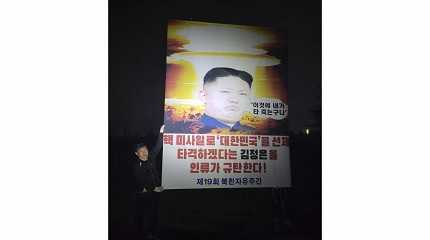
SEOUL, South Korea (AP) — South Korean activists say they clashed with police while launching balloons carrying anti-Pyongyang propaganda materials across the North Korean border, ignoring their government’s plea to stop such activities since the North has threatened to respond with “deadly” retaliation.
Park Sang-hak, a North Korean defector-turned-activist, said he his group had launched about eight balloons from an area in the South Korean border town of Paju Saturday night when police officers arrived at the scene and prevented them from sending their 12 remaining balloons. Park said police confiscated some of their materials and detained him and three other members of his group over mild scuffles with officers before releasing them after questioning.
Officials at the Paju police and the northern Gyeonggi provincial police agencies didn’t immediately respond to requests for comment Sunday.
The balloons flown toward North Korea carried masks, Tylenol and Vitamin C tablets along with propaganda materials, including booklets praising South Korea’s economic wealth and democratic society and hundreds of USB sticks containing videos of U.S. Congress members denouncing the North’s human rights record, Park said.
One of the balloons carried a placard that read, “Entire humanity denounces Kim Jong Un who threatens to preemptively strike (South Korea) with nuclear missiles,” referring to the North Korean leader’s escalatory nuclear doctrine that’s raising tensions with neighbors.
Saturday’s launch came weeks after South Korea’s government pleaded for activists to stop their balloon launches, citing concerns related to the safety of border area residents. Lee Hyo-jung, spokesperson of Seoul’s Unification Ministry, then said that the South would also “sternly respond” to any North Korean retaliation over the balloons.
Animosity between the Koreas has worsened this year as North Korea ramped up its missile testing activity to record pace and punctuated those tests with warnings that it would preemptively use its nukes in a broad range of scenarios where it perceives its leadership has come under threat.
North Korea is extremely sensitive to outside criticism about the Kim family’s authoritarian rule of its people, most of whom have little access to foreign news. It has berated South Korea’s current conservative government for letting South Korean civilian activists fly anti-Pyongyang propaganda leaflets and other “dirty waste” across the border by balloon, even dubiously claiming the items caused its COVID-19 outbreak.
For years, Park has floated helium-filled balloons with leaflets and other propaganda material harshly criticizing the Kim family. He also began sending masks, medicine and vitamins following the emergence of COVID-19.
Last year, South Korea, under its previous liberal government that sought to improve inter-Korean ties, enforced a contentious new law criminalizing civilian leafleting campaigns. Park still kept launching balloons, becoming the first person to be indicted over that law, but his trial has basically been put on hold since he filed a petition requesting the Constitutional Court to rule whether the new law is unconstitutional, according to his lawyer, Lee Hun.
Opponents of the law say it’s sacrificing South Korea’s freedom of speech in attempting to improve ties with North Korea. Supporters say the law is aimed at avoiding unnecessarily provoking North Korea and promoting the safety of frontline South Korean residents.
In 2014, North Korea fired at balloons flying toward its territory, and in 2020 it destroyed an empty South Korean-built liaison office in the North to express its anger over leafleting. In a failed assassination attempt in 2011, South Korean authorities captured a North Korean agent who tried to kill Park with a pen equipped with a poison needle.




